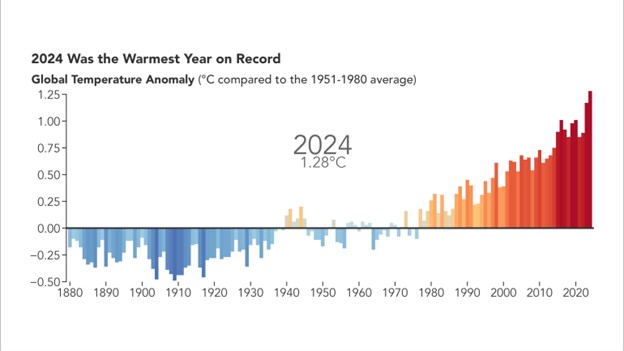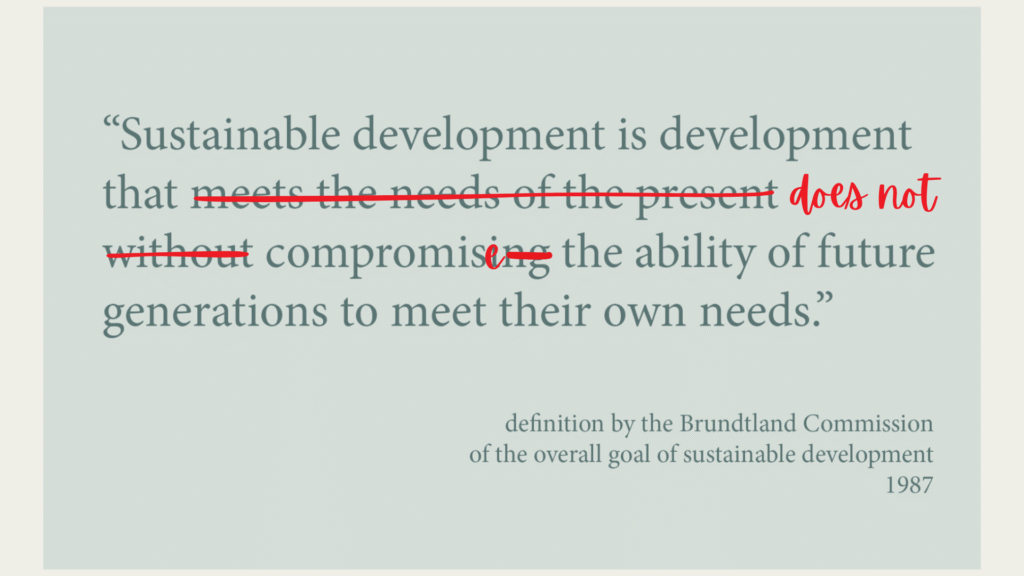The truth is that the world today demands that we act differently than we have in the past. You may feel tempted to tune out, scroll past, or tell yourself someone else will take care of it. But I hope you don’t.
We cannot rely on others to provide solutions for the climate crisis. There is not enough time for us to just sit back and wait. We cannot pin our hopes on policy, innovation or expect those in power to fix the planet’s health without our help. It is up to us – all of us. And it is time for us to collectively begin making meaningful changes in our own lives and communities. Right now.

The science is clear
Let’s start with what we know. The Earth is heating up. “Temperature records agree, and natural evidence backs it up: Global surface temperature has increased faster since 1970 than in any other 50-year period over at least the past 2,000 years.” (Marder & Marder, 2025)
These rising temperatures drive more than discomfort – they fuel wildfires, extreme rainfall, dangerous heat waves, coastal flooding, and ecosystem collapse. And we cannot forget that the temperature increase is just an indicator of the increase in greenhouse gases.
Carbon dioxide (CO₂) and the other greenhouse gases in our atmosphere have reached unprecedented levels. According to NASA, as of May 2025, the measurement was 430.51 parts per million, compared to just 315.87 parts per million in 1958. Parts per million refer to the number of CO2 equivalent molecules per million molecules in the air. These are found in the mid-troposphere – which is a part of our atmosphere approximately 5-7 miles above sea level. We do not know the precise tipping point for greenhouse gases, but we do know we are getting closer. And quite obviously global warming has already made an impact.
UN reports suggest that keeping global temperatures to a rise of no more than 1.5 degrees Celsius may avoid the worst but based on our current standards of living and anthropogenic emissions, temperatures are likely to increase by more than 3 degrees Celsius within the next seventy-five years. Because everything is interconnected, scientists do not really know how well the planet can withstand any part of this temperature increase, but the prognosis is not good.
Optimism is the only way forward
I get it! I feel it too! It can be really scary! But this is not the moment to look away. It is not the time to push this problem to the back burner. And it is definitely not the time to wait and see. Instead, this is the moment to choose optimism – not blind positivity, but empowered, informed optimism. Optimism gives us the strength to act and the power to push through. It reminds us that solutions are still possible and that we are not powerless. In fact, we may be more powerful than we think.
As Sir David Attenborough put it: “What good does it do to say, ‘Oh, to hell with it, I don’t care.’ You can’t say that. Not if you love your children. Not if you love the rest of humanity – how can you say that?” (Cooper, 2020)
Trust your instincts. You are wired for good
Still don’t feel ready to take on the world. Trust your instincts. Research from Harvard and Yale found that humans are naturally cooperative when acting on instinct. In other words, when we do not overthink, when we act from the gut, we choose to help. We collaborate. We lead. We solve problems not just for ourselves, but for the good of the group.
That is what we need right now: fewer barriers, less hesitation, and more of that innate drive to do what is right. Stop waiting for perfect conditions. Stop telling yourself it is too hard. Follow your natural impulse to make a difference and begin with some sustainable lifestyle changes.

Enter the 6 R’s: a new way to live sustainably
A format guiding sustainable decision making already exists. Your contribution just requires that you be in that place of optimism and are ready to act from a mindset of doing something great. Getting into that mindset may require a shift. Facing the reality of our climate emergency is unfortunately the first step. But from there, move toward hope – the hope that comes from realizing you have power and can control outcomes. Every small choice matters. And together, our small choices add up to big impactful changes.
Sustainable choices are ones that put the health of the planet at the forefront of your decision making while also ensuring that you do not compromise the ability of future generations to meet their needs – while still having the opportunity to live their best life. Each generation moving forward should have a better opportunity at a better life. That is not the world’s current reality, but we have the ability to make it so.
That is where the updated 6 R’s of sustainability come in. You may have grown up hearing the classic 3 R’s: Reduce, Reuse, Recycle. But today, that is not enough. Recycling, while still important, has now become the last resort.
The 6 R’s can guide a new approach
1. Rethink
Start here. Ask yourself, do I need more? Can I live with less? What is the true cost of my consumption? Rethinking means questioning default habits, recognizing abundance, and choosing a simpler, more intentional path forward.
2. Refuse
Just say no! Say no to unnecessary consumption, fast fashion, single-use items, and unsustainable options. This will take practice. We have all been living for so long with convenience that we have forgotten how much it compromises our values and what is truly most important to us. Try to choose secondhand. Demand better from the brands you shop. Refuse what does not align with a healthy future.
3. Reduce
Simply consume less! Okay, I know that none of this is really simple but keep that hope and mindset intact and together we can do this! As part of your “rethink,” remember that we are a finite planet with limited natural resources. Reducing use is an absolute must! When you minimize your consumption, you automatically minimize your waste. Keep your mindset grounded in the fact that there is no “away.” Trash does not disappear; it just goes somewhere that you cannot see it. And, as a reminder, much of the world’s plastic is not recycled so reducing is an extremely important way to lessen your environmental footprint.
4. Reuse
Hold onto what you already own and extend its use. Find creative ways to extend an item’s lifespan, even if it means using it for something new. And when you have to buy new, make sure you purchase quality over quantity, and for sure, quality over fast and cheap.
We have been tricked into buying cheap items – that $5.00 shirt – because “why not, it’s so cheap! I can just throw it away and get a new one!” It is important for us to stop associating waste with money and instead reconnect waste with our planet’s health. Sustainable may cost more upfront but if it lasts, then it’s a better deal all around. Regardless, reusing is not just about being thrifty. It is about sending a powerful message about what you require as a consumer and about the choices that you are willing to make.
5. Repair
Demand that companies you buy from provide you with manuals and tools so that you can repair what you purchase. It is not okay for companies to purposely create items for purchase that cannot be repaired or are designed with a shortened lifespan. You have the power to choose, and your dollars dictate how companies behave. Do not give up that power for a perceived convenience. Repairing gives items longer lifespans and pushes back against a culture of disposability. Use your purchasing power to support companies that value durability and transparency.
6. Recycle
Yes, of course, 100% still recycle! But treat it as a last option, not the first – and for sure not the only! Recycling consumes energy and resources, not just in the process of recycling but in the original raw materials, production, and distribution of an item. If you have already applied the other 5 R’s, there should be far less to toss in the blue bin, meaning a lot less waste overall.
Where does this leave us?
My hope is that we can all live in this new space permanently. Right where we need to be! Awake, aware, engaged, and motivated to act. None of us needs to be perfect. We do not need to know everything or have all the answers. But we do need to begin. Every one of us.
Start by rethinking daily habits. Refuse what does not serve the planet. Reduce consumption. Reuse what you already have. Repair what you can. And finally, recycle what is left.
The 6 R’s are more than a sustainability checklist. They are a mindset. A compass. A way to live with purpose in a time that desperately needs it. The climate crisis is real. The time is now. And all of our choices matter.
So, trust your instincts. Choose cooperation over convenience. And do not wait for someone else to implement at change – together we need to lead the change.
References:
- The Six Rs of Sustainability: what are they? (2025, March 7). Greenly. https://greenly.earth/en-us/blog/company-guide/the-six-rs-of-sustainability-what-are-they
- Ward, A. F. (2024, February 20). Scientists probe human nature–and discover we are good, after all. Scientific American. https://www.scientificamerican.com/article/scientists-probe-human-nature-and-discover-we-are-good-after-all/
- Marder, J., & Marder, J. (2025, January 28). This is How Scientists Measure Global Temperature – NASA Science. NASA Science. https://science.nasa.gov/earth/measuring_global_temperature/
- Cooper, A. (2020, September 27). Sir David Attenborough explains what he thinks needs to happen to save the planet – 60 Minutes. CBS News. https://www.cbsnews.com/news/david-attenborough-climate-change-a-life-on-our-planet-60-minutes-2020-09-27/?ftag=CNM-00-10aab5j&linkId=100596412&fbclid=IwY2xjawLJFHNleHRuA2FlbQIxMABicmlkETFvM1JCcGE0cmE0RVN0bktDAR4DLzrAMMt0MRWff_zpJnPgYqhBqi4Ic_ZVzYFzfd4xcqnhLCdX1DrKoASlqg_aem_lu_8tvMeQy2UZF1kARvS6Q

Leave a Reply